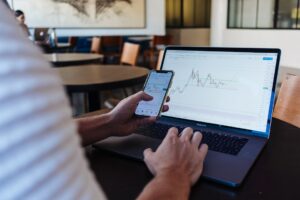How to Spot a Scam Broker in Forex Trading: A Comprehensive Guide
Forex trading is a highly lucrative market where traders can make substantial profits by buying and selling currencies. However, this market is also prone to scams and fraudulent activities by unscrupulous brokers who exploit unsuspecting traders. Spotting a scam broker is crucial to protect your investments and ensure a safe trading environment. In this comprehensive guide, we will discuss various red flags to watch out for when selecting a forex broker.
1. Regulatory Compliance:
One of the first steps to identifying a legitimate forex broker is to check their regulatory compliance. Reputable brokers are registered with regulatory authorities, such as the Financial Conduct Authority (FCA) in the UK or the Securities and Exchange Commission (SEC) in the United States. These regulatory bodies have strict guidelines that brokers must adhere to, including capital requirements and client fund segregation. Always verify the broker’s regulatory status before depositing any funds.
2. Transparent Fee Structure:
Scammers often lure traders with promises of low spreads and zero commission fees. However, they may have hidden charges or manipulate spreads to their advantage. Legitimate brokers have a transparent fee structure that clearly outlines all charges, including spreads, commissions, and withdrawal fees. Make sure to read the broker’s terms and conditions regarding fees and charges before opening an account.
3. Unrealistic Promises:
Scam brokers often entice traders with unrealistic promises of high returns and guaranteed profits. Forex trading involves risks, and there are no guarantees of making consistent profits. If a broker guarantees fixed profits or claims to have a secret trading strategy, it is a major red flag. Legitimate brokers always emphasize the risks involved in trading and provide realistic expectations.
4. Poor Customer Service:
A reliable forex broker should have excellent customer service to assist traders with their queries and concerns. Scammers often have poor customer support or even non-existent support channels. Before opening an account, test the broker’s customer service by contacting them with some questions and evaluating their response time and professionalism. Legitimate brokers have responsive customer support available via phone, email, and live chat.
5. Negative Reviews and Ratings:
Researching a broker’s reputation is crucial before making any commitments. Look for unbiased reviews and ratings from trusted sources, such as forex forums or review websites. If you find numerous negative reviews or complaints about a broker’s practices, it is a clear warning sign. Pay attention to recurring issues, such as withdrawal problems or manipulation of trades. Positive reviews and a good track record are indications of a trustworthy broker.
6. Lack of Transparency:
Scam brokers often lack transparency in their operations. They may not provide clear information about their ownership, background, or physical address. Legitimate brokers are transparent and provide detailed information about their company, management team, and location. Check if the broker has a physical office that you can visit or if they are operating solely online.
7. Non-Segregated Client Funds:
Client fund segregation is a regulatory requirement for legitimate brokers. It ensures that client funds are kept separate from the broker’s own operating funds. This segregation protects traders’ funds in case the broker faces financial difficulties or goes bankrupt. Scam brokers may not segregate client funds, which puts your money at risk. Always verify if a broker complies with fund segregation rules.
8. High-pressure Sales Tactics:
Scammers often employ high-pressure sales tactics to push traders into making hasty decisions. They may use aggressive marketing techniques or offer limited-time promotions to create a sense of urgency. Legitimate brokers provide comprehensive information and let traders make informed decisions without pressure. Be cautious of brokers who employ pushy sales tactics to get you to deposit funds quickly.
In conclusion, spotting a scam broker in forex trading requires careful research and due diligence. Always verify a broker’s regulatory compliance, transparent fee structure, reputation, customer service, and fund segregation practices. Avoid brokers making unrealistic promises or using high-pressure sales tactics. By following this comprehensive guide, you can protect yourself from falling victim to forex scams and ensure a safe trading experience.






